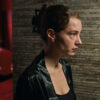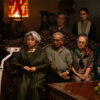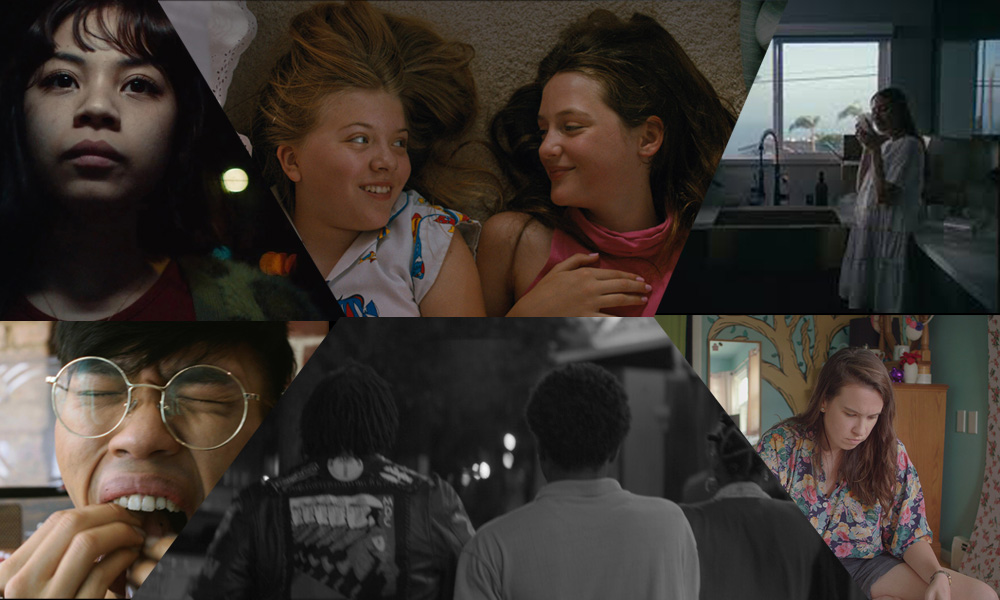When Caryn Coleman returns to Los Angeles this week, the sight of a crowd she brought together to enjoy art won’t be unfamiliar, but the venue will be when Vidiots in Los Feliz plays host to a night of shorts from The Future of Film is Female. Once the owner of a gallery in the city after devoting her early career to the visual arts, she has taken a talent for curation to the film world, finding a passion for it while getting a graduate degree in Goldsmiths College in London and receiving an entirely different education upon arriving back in the States where it was the good fortune of the newly opened Nitehawk Cinema in Williamsburg to hire her. Coleman wouldn’t just be booking movies, she’d be building a community.
“In 2013, I was just starting out as a film programmer and Nitehawk, which was still very young at the time, was also expanding into doing programming outside of theatrical runs,” recalls Coleman of an early pivotal screening of Cheryl Dunn’s documentary “Everybody Street,” celebrating the photography of New York greats such as Mary Ellen Mark, Bruce Davidson and Jamel Shabazz. “I honestly can’t remember how I got in touch with Cheryl Dunn, but I loved ‘Everybody Street’ and booked it for one screening and we also had most of the photographers featured in the documentary there. Then that sold out. We added another. Then that sold out,” says Coleman. “We added a weekend and then a week — all selling out. It gave me confidence in my taste and that audiences will come out for good films. And it gave the cinema the same confidence.”
In her time at Nitehawk, Coleman turned the theater into a destination for locals and even gained a reputation beyond Brooklyn as a horror haven and a filmmaker launchpad with its annual Shortsfest. Yet her most cherished creation would become a full-time occupation when what began as screening series at the theater — The Future of Film is Female — has now evolved into a full-fledged nonprofit that has introduced and supported countless female and nonbinary filmmakers, opening the doors to some of New York’s most hallowed halls to those who rarely felt welcomed in the past with its biannual two-week series at the Museum of Modern Art and regularly programming and partnering on screenings of features, ranging from current festival sensations to revivals and restorations, at the Nitehawk, Metrograph, IFC Center, and Film Forum. But beyond creating a perpetual excitement around the events by keeping a busy calendar of exhibition, the FOIFF’s support now extends to providing grants for shorts, often offering that little extra bit of encouragement to get them off the ground or to fine-tune it in post-production.
With their logo nearly as ubiquitous in festival lineups as they are on T-shirts worn by attendees, the FOFIF has helped establish a host of bold new filmmakers at a pivotal point in their careers to a larger audience. (Recent favorites of ours have included Ivete Lucas and Patrick Bresnan’s “The Passing,” and Erin Vassilopoulos’ “Step Into the Mattress”.) And in the midst of expanding their reach westward in recent years with regular screenings at PAMCut in Portland and the American Cinematheque in Los Angeles, the FOFIF has set a truly special evening at Vidiots on July 10th for a showcase of homegrown shorts that honor the range of filmmakers the FOFIF has supported over the years, from Amber Sealey (“How Does It Start”) and Hannah Peterson (“Champ”), who have honed their craft in between features, to newcomers such as Olivia Accardo (“Finding Beast”) and Jessica Barr (“Tight”), all working across a variety of genres. Fittingly for an organization that’s long embraced the sparks of different worlds colliding, the evening will be hosted by filmmakers and fashion designers Kate and Laura Mulleavy and before the festivities can commence, Coleman graciously took time out away from the preparations to answer a few questions via e-mail about the past of The Future of Film is Female, staying in touch with the present cultural moment and where it’s all headed.
Since The Future of Film is Female screening series started in New York, it surprised me to learn that you actually had a previous life here in Los Angeles as the an art gallery owner. Was that experience formative in how you thought about all this with a background in curation?
This is a Los Angeles homecoming for me! I lived here for about eight years in the 2000s and it’s very special that I’m coming back to my favorite city to present a program by filmmakers who are so dear to me. L.A. has a long, strong history of having a vibrant cultural scene and I’ve always found inspiration in creative renegades like Ed Ruscha, Ed Kienholz, Mary Kelley, and Marnie Weber, so it’s an honor to be back and to partner with Vidiots, who are undoubtedly at the forefront of the cinema revolution currently happening in the city.
I’ve been away from the visual arts and immersed happily in the film world for over a decade now, but I’ve found that I approach the two very similarly — filmmaker/artist forward. I’m also always asking myself “Why is this important now?” and just trusting my gut that this is a project that must be seen. Both are about connecting work with audiences; it’s just that I have found much more purpose and pleasure in working in the film world.
How you actually go about curating a night like this one coming up at Vidiots? What’s it like to figure out the right lineup?
By the nature of where I live and work, I get to spend more time with our New York filmmakers, so it’s time to show some love to Los Angeles! Seriously though, we do an annual short film program of our filmmakers at MoMA each fall and I have been wanting to do the same program in Los Angeles. I’ve been in conversation with the incredible Maggie Mackay at Vidiots about working together since 2020 and now it’s the perfect time.
To answer how I approach the program, it’s again the idea of scope and not having one “kind” of short film. I tend to approach my shorts programs as a flowing conversation rather than thematic. And here you’ll get to see all kinds – coming of age, cat haunting, revenge, abortion rights, and pot loving.
It could just be a reflection of your own voracious personal tastes, but the breadth of films and filmmakers The Future of Film is Female has supported has always been quite diverse. Has that come about organically?
I love movies. All kinds of movies. So I want to work with and support a breadth of storytelling. Some I personally love more, like horror, and you’ll certainly find that represented in both our Short Film Fund and screenings. But I feel like, even within this broad scope, there is an overall vibe of The FOFIF which, I suppose, comes from me, but also from where independent film is at right now.
Your first FOFIF event at Nitehawk was more like a traditional festival, where it was a multi-day affair, but it feels like you’ve been able to expand by getting more compact with these individual evenings of short programs taking place at Museum of Modern Art in New York, PAMCut in Portland and now Vidiots. How has your thinking evolved in terms of exhibition?
In 2013 I started the annual Nitehawk Shorts Festival and from that program, I found myself finding a real community with filmmakers of all genders. After the 2016 election, I thought how, as a film programmer, could I help get marginalized voices (a.k.a. the ones I was afraid would be stamped out in the Trump administration) out into the world both in terms of creating works but also getting them in front of people; something I have the privilege to do with my job. So in February 2018, I officially started The FOFIF by selling t-shirts to fund two micro-grants. Then in July 2018, I had the first dedicated FOFIF series at MoMA. Although my focus on women and nonbinary filmmakers had been inherent to the work I was already doing at Nitehawk. It wasn’t until the pandemic shutdown happened that I was able to make FOFIF a non-profit and decided to dedicate myself to the organization full-time.
I’m fortunate that I still have a home at Nitehawk where we program two to four screenings per month. We also have an amazing platform at MoMA where we’ll be having our fifth FOFIF program in 2025. As the years have gone on, we’ve established great relationships with other New York cinemas like Film Forum, IFC Center, Roxy Cinema, and Quad. And we’re slowly moving to the west coast with ongoing screenings at PAMCut’s Tomorrow Theater, where I’m also a booker and programming consultant, and the American Cinematheque. And now finally with our friends at Vidiots!
When did it click that you needed to go beyond exhibiting the films to helping to cultivate these filmmakers, seeing what the needs are whether it was financing or other resources?
It’s funny because I see exhibiting films as going beyond helping films getting made. While there is not enough money ever, there are many resources allotted to financing, grants, and residencies. So while we absolutely think it’s essential for us to support short film production with our grant (that’s both financial and in-kind post-production services), what’s most important is to continue working with those filmmakers throughout their career — ensuring their shorts are seen, their features get recognition, and that we’re here to help provide resources. We like to say that FOFIF is the “now what?” after your film is made because exhibition is so important to us.
You can see the influence you’ve had in many film scenes and festivals by how many people are wearing the FOFIF T-shirts. How did that become the idea to raise money for the organization?
The name was the first idea of how to make it immediately clear of what our mission is and also to tie it into the feminist history of the original shirt “The Future is Female” created in the 1970s. At the time, shirts like that were popular and I knew it would create community, so it seemed like the perfect way to start fundraising for our first short film fund. Still today, ALL of the proceeds of our shirt sales go to The FOFIF Short Film Fund.
The Future of Film is Female Shorts Program will screen at Vidiots in Los Angeles on July 10th at 7:30 pm. A full calendar of The Future of Film is Female events is here.




